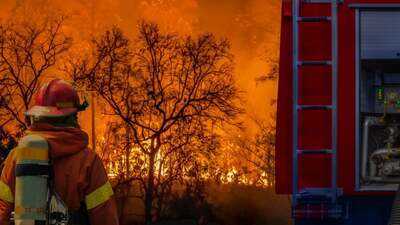
The devastating wildfires in Los Angeles County have engulfed more than 36,386 acres, leaving behind a trail of destruction. Numerous homes and structures have been destroyed, lives have been lost, and thousands of residents have been displaced. Firefighting teams are struggling to contain the flames, and concerns about the adequacy of resources have come to the forefront.
Resource strain
Governor Gavin Newsom in an interview with CNN recently shared that local resources have been completely depleted. Fire hydrants, a crucial firefighting resource, have run dry, creating significant obstacles for crews on the ground. The crisis has sparked questions about alternative water sources, such as using seawater, given the city's proximity to the Pacific Ocean.

Why seawater can't be used for wildfires?
While seawater seems like an abundant and convenient option, it is far from ideal for fighting wildfires. The high salt content presents several issues. Salt can corrode equipment like water pumps and planes, leading to expensive repairs and reduced efficiency. Moreover, seawater does not cool flames as effectively as fresh water.
Safety is another concern. Salt water conducts electricity better than fresh water, which increases the risk of electrical hazards during firefighting operations. These risks and logistical and operational complexities make seawater an impractical choice for large-scale use.
What are environmental risks of using salt water?
Using salt water to fight fires also raises environmental concerns. When large amounts of salt water are applied, the salt can seep into the soil, increasing salinity levels and harming the ecosystem. This can delay the recovery of fire-affected areas by making the soil toxic and less fertile for vegetation.
Additionally, salt water runoff into rivers, lakes, or other water bodies can disrupt aquatic ecosystems, threatening fish and wildlife. These environmental impacts force fire officials to carefully evaluate when, if ever, salt water should be deployed.
Innovative solutions needed
The ongoing wildfire crisis highlights the urgent need for improved firefighting resources and water management systems. Existing infrastructure, such as hydrants, is proving insufficient in tackling wildfires of this magnitude. Investing in advanced technologies and sustainable strategies is essential to address the growing intensity and frequency of wildfires.